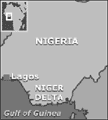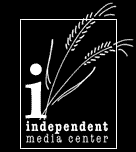|
|
|
|
The
Ogoni Struggle in Nigeria
by Al Kagan
 
Nigeria was a colony of Great Britain
from the turn of the twentieth century until 1960. It
is about 1/3 larger than the state of Texas, but is by
far the most populous country in Africa with over 120
million people. There are about 250 distinct ethnic groups
in the country, each with its own language. Perhaps ten
million people from twelve major ethnic groups live in
the Niger Delta. Among them are the Ogoni, a group of
perhaps 500,000 who live right in the oil fields. Before
proceeding, I want to point out that I use the term "ethnic
group" rather than "tribe" quite deliberately.
Perhaps Africans would feel better about the way Westerners
use the term "tribe" if we also applied it to
the European people in the former Yugoslavia or similar
cases elsewhere. "Tribe" has a negative connotation
implying "primitive." Such conceptions immediately
call up stereotypical conceptions of "tribal"
warfare, negating the need for rigorous analysis of political
and economic factors behind events.
Nigeria is the world's eighth largest producer of oil,
but most of its people remain poor, lacking running water,
health care, and other social services. Counter-intuitively,
oil riches often bring trouble rather than prosperity.
Oil wealth is often kept in the hands of the few, a national
elite allied with transnational corporations, such as
Shell Oil in Ogoniland and Chevron in other areas of the
Niger Delta. Mobil is also present in other areas of the
country. Shell produces half of Nigeria's oil, 14% of
Shell's worldwide production, $300 billion worth since
1958. As in other oil rich countries, US power has propped
up successive dictatorships, i.e., governments friendly
to transnational corporations and the Western powers.
One of the most brutal military dictators, General Ibrahim
Babangida, received military training in the US. The United
States is Nigeria's largest oil market, consuming 40%
of Nigeria's oil production. Nigeria is the fifth largest
oil supplier to the US providing 10% of US needs. Nigeria
is the largest US trading partner in Africa south of the
Sahara.
The Ogoni Struggle
Great Britain completed its subjugation of Nigeria in
1906, but Shell Oil didn't appear until 1958, two years
before political independence. As other Nigerians, the
Ogoni suffered through many military regimes. Repression
intensified under General Babangida who took power in
1985. For example, the Etche community, neighbors of the
Ogoni, suffered 80 killed and 495 houses burned down in
1990 for daring to protest around their environmental
concerns.
The Movement for the Survival of the Ogoni People (MOSOP)
came to the fore around this time. This grassroots organization
was led by one of Nigeria's most famous writers, Ken Saro-Wiwa.
MOSOP issued its Ogoni Bill of Rights in 1990, 1/3which
called for community control over its own resources and
autonomy over its own affairs. It looked like military
rule would finally come to end when Moshood Abiola was
elected on June 12, 1993 but General Sani Abacha took
power instead. Abiola was eventually sent to prison and
ended up dying there under very suspicious circumstances.
Meanwhile the Ogoni people were still suffering the devastation
of their polluted land. The Nigerian dictatorship was
spending about $15 million per year on public relations
in the United States, and organized propaganda tours for
prominent African-Americans including Illinois Senator
Carol Moseley-Braun (a factor in her eventual election
defeat).
Ken Saro-Wiwa and eight other MOSOP activists were convicted
by secret military tribunal of killing some community
leaders in 1995 on clearly fraudulent charges. They were
sent to prison. Ken's brother, Dr. Owens Wiwa, then met
with Shell's Managing Director, Brian Anderson. Shell's
role came out into the open when Anderson guaranteed saving
Saro-Wiwa's life if MOSOP would call off its campaign.
Nelson Mandela called for the release of Saro-Wiwa and
urged sanctions against Nigeria at the Commonwealth Conference.
But on November 10, 1995, during the conference, Abacha
had Ken Saro-Wiwa and the other eight MOSOP members executed.
It was obvious that Abacha could not have cared less about
international opinion. This led to a worldwide sanctions
movement and Shell boycott, including in Champaign/Urbana.
Members of our community picketed the Shell Gas Station,
then on the corner of Green and Neil Streets. As with
the current sweatshop movement, this is an example of
local movements at the point of production working with
local movements at the point of consumption, a necessary
strategy in the globalized world. The main organizations
promoting the struggle against Shell were Greenpeace,
the Sierra Club, Amnesty International, Human Rights Watch,
and many churches. Unfortunately little changed for the
Ogoni people. Abacha arranged for an illegal $500,000
contribution to Clinton election campaign in 1996 and
the US adopted a policy of "constructive engagement,"
just as President Reagan had done with South Africa where
Shell had broken the oil embargo against the apartheid
regime. Just as depicted in the Delta Force video, pipeline
breaks continued, and some of them were actually caused
by local people who siphoned off the oil to make a meager
living. A 1998 pipeline valve break and subsequent fire
killed 1000 people who were trying to retrieve oil while
wading in it. Shell admitted spilling 50,200 barrels in
1998. Due to massive protests, Shell suspended it operations
in Ogoniland, leaving its infrastructure intact and continuing
operations in neighboring provinces. The assassination
of dictator Abacha in 1998 led to calls for installation
of Abiola, winner of the 1993 elections, as President.
Abacha's successor, General Abubakar offered freedom to
Abiola, only on the condition that he give up his claim
to the Presidency. Mysteriously, Abiola died during a
visit from an official US delegation which had come to
convince him to give up his election. The military explained
his death as a heart attack. In May of the following year,
1999, another general, Olusegun Obasanjo, was elected
in what most think was a fair election. With the promise
of stability, US aid went from $7 million to $170 million
per year. In 1999, Shell further damaged the Nigerian
environment by spilling 123,377 barrels of oil. And it
is still trying to resume its former operations in Ogoniland--and
even to open new oil fields offshore. In April 2000, security
forces killed 5 people and burned 20 homes during a peaceful
protest against Shell's attempt to resume operations.
In June 2000, a court ordered $40 million compensation
to Ebubu village for river pollution, but Shell is appealing.
In August 2000, thugs attacked Korokoro village where
Shell was trying to restart work. Federal troops destroyed
Odi Town and killed 42 in November 2000. Another pipeline
explosion killed 50 in December 2000. Finally, in November
2002, there was a community meeting with the Nigerian
Government to negotiate a settlement for Ogoni claims.
It remains to be seen whether or not the Government will
honor the agreement.
Nigeria, International Oil Politics,
and the "War on Terrorism"
The relationship between oil and "terrorism of course
extends well beyond the terrorism directed against the
Ogoni people by Nigerian dictators at the behest of the
Nigerian elite and Shell Oil. Indeed, the Nigerian case
is a great help in understanding the current world situation
and the US "War against Terrorism." The Caspian
Sea in Central Asia may have more oil than the Persian
Gulf. In 1995, Unocal Oil decided that it needed a pipeline
from Turkmenistan through Afghanistan and Pakistan to
the Arabian Sea, but the Taliban were not cooperative.
Unocal Oil hosted Taliban delegates in Texas in 1997 and
gave an initial $1 million for a job-training program
in Kandahar. Unocal eventually spent about $20 million
on this project, but they were hedging their bets by also
hosting some of the Northern Alliance warlords. In 1998
testimony before the US Congress, a Unocal official said,
"If the Taliban leads to stability and international
recognition, then its positive." A September 2001
US Energy Information Administration (a federal agency)
document issued before September 11th noted Afghanistan's
key position for the needed pipeline in its first paragraph.
Of course, oil doesn't explain everything about the US
war against Afghanistan, but it is an important component.
Postscript This article follows on a December 2001
IMC event, a benefit for the new Nigerian IMC. We had
live African music and a showing of the video, Delta Force,
about the struggle of the Ogoni people of Nigeria against
Shell Oil and the Nigeria Government. For those who would
like to see it, a copy of the video is available in the
IMC Library at 218 W. Main St. in Urbana. Al Kagan is
the African Studies Bibliographer at the University of
Illinois Library. |
|
|
|






